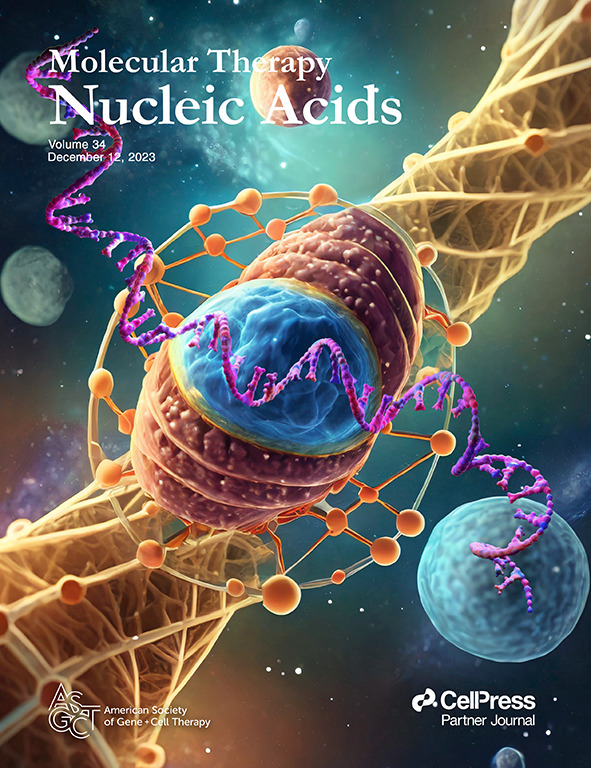Enhancing natural killer cells proliferation and cytotoxicity using imidazole-based lipid nanoparticles encapsulating interleukin-2 mRNA
IF 6.5
2区 医学
Q1 MEDICINE, RESEARCH & EXPERIMENTAL
引用次数: 0
Abstract
mRNA applications have undergone unprecedented applications—from vaccination to cell therapy. Natural killer (NK) cells are recognized to have a significant potential in immunotherapy. NK-based cell therapy has drawn attention as allogenic graft with a minimal graft-versus-host risk leading to easier off-the-shelf production. NK cells can be engineered with either viral vectors or electroporation, involving high costs, risks, and toxicity, emphasizing the need for alternative way as mRNA technology. We successfully developed, screened, and optimized novel lipid-based platforms based on imidazole lipids. Formulations are produced by microfluidic mixing and exhibit a size of approximately 100 nm with a polydispersity index of less than 0.2. They are able to transfect NK-92 cells, KHYG-1 cells, and primary NK cells with high efficiency without cytotoxicity, while Lipofectamine Messenger Max and D-Lin-MC3 lipid nanoparticle-based formulations do not. Moreover, the translation of non-modified mRNA was higher and more stable in time compared with a modified one. Remarkably, the delivery of therapeutically relevant interleukin 2 mRNA resulted in extended viability together with preserved activation markers and cytotoxic ability of both NK cell lines and primary NK cells. Altogether, our platforms feature all prerequisites needed for the successful deployment of an NK-based therapeutic strategies.利用包裹白细胞介素-2 mRNA 的咪唑基脂质纳米颗粒增强自然杀伤细胞的增殖和细胞毒性
从疫苗接种到细胞疗法,mRNA 的应用经历了前所未有的发展。自然杀伤(NK)细胞被认为在免疫疗法中具有巨大潜力。基于 NK 的细胞疗法作为异基因移植引起了人们的关注,它的移植物抗宿主风险极低,更易于现成生产。NK 细胞可通过病毒载体或电穿孔技术工程化,但成本高、风险大、毒性强,因此需要采用 mRNA 技术作为替代方法。我们成功开发、筛选并优化了基于咪唑脂质的新型脂质平台。制剂通过微流体混合生产,大小约为 100 纳米,多分散指数小于 0.2。它们能高效转染 NK-92 细胞、KHYG-1 细胞和原代 NK 细胞,且无细胞毒性,而基于 Lipofectamine Messenger Max 和 D-Lin-MC3 脂质纳米颗粒的制剂则不能。此外,与修饰的 mRNA 相比,未修饰的 mRNA 的翻译率更高,时间上也更稳定。值得注意的是,输送治疗相关的白细胞介素 2 mRNA 能延长 NK 细胞系和原代 NK 细胞的存活时间,并保留其活化标志物和细胞毒性能力。总之,我们的平台具备了成功部署基于 NK 的治疗策略所需的所有先决条件。
本文章由计算机程序翻译,如有差异,请以英文原文为准。
求助全文
约1分钟内获得全文
求助全文
来源期刊

Molecular Therapy. Nucleic Acids
MEDICINE, RESEARCH & EXPERIMENTAL-
CiteScore
15.40
自引率
1.10%
发文量
336
审稿时长
20 weeks
期刊介绍:
Molecular Therapy Nucleic Acids is an international, open-access journal that publishes high-quality research in nucleic-acid-based therapeutics to treat and correct genetic and acquired diseases. It is the official journal of the American Society of Gene & Cell Therapy and is built upon the success of Molecular Therapy. The journal focuses on gene- and oligonucleotide-based therapies and publishes peer-reviewed research, reviews, and commentaries. Its impact factor for 2022 is 8.8. The subject areas covered include the development of therapeutics based on nucleic acids and their derivatives, vector development for RNA-based therapeutics delivery, utilization of gene-modifying agents like Zn finger nucleases and triplex-forming oligonucleotides, pre-clinical target validation, safety and efficacy studies, and clinical trials.
 求助内容:
求助内容: 应助结果提醒方式:
应助结果提醒方式:


